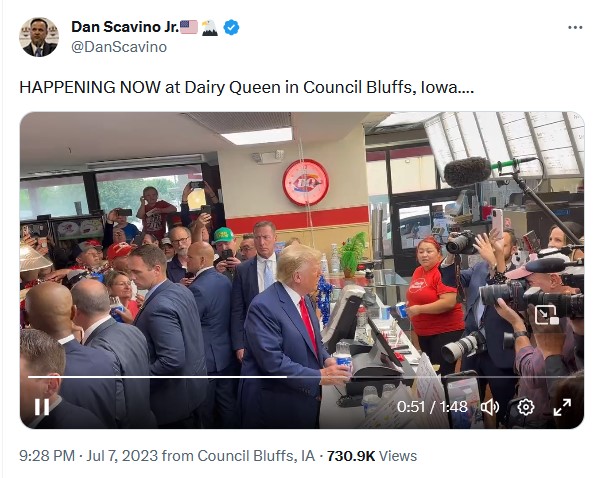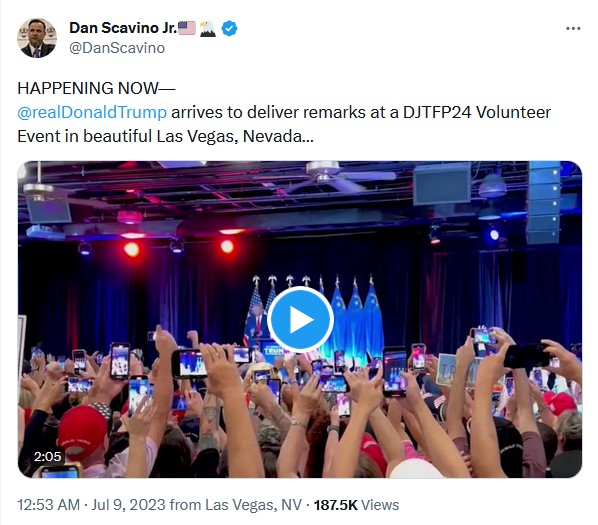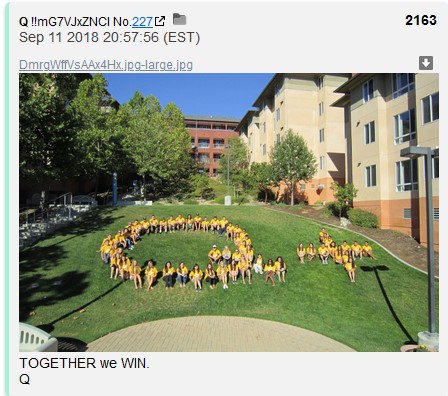It looks like you're using an Ad Blocker.
Please white-list or disable AboveTopSecret.com in your ad-blocking tool.
Thank you.
Some features of ATS will be disabled while you continue to use an ad-blocker.
share:
a reply to: YippiKyAA
Have you watched Horrace Drew, an expert crop circle analyst?
Here's a Youtube lecture of his that you might find interesting.
Horace Drew Youtube
Have you watched Horrace Drew, an expert crop circle analyst?
Here's a Youtube lecture of his that you might find interesting.
Horace Drew Youtube
Second Wave Of Banking Crisis Incoming, Crash Could Rival 2008 Global Financial Fallout: Macroeconomic Expert George Gammon
dailyhodl.com... ge-gammon/amp/
Fed interest-rate hike seen a lock for July
www.reuters.com...
Macroeconomic expert George Gammon believes a second wave of bank failures is on the horizon.
In a new update to his 480,000 YouTube subscribers, Gammon points to a parabolic burst of bank borrowing from America’s Federal Home Loan Bank (FHLB) system and the newly formed Bank Term Funding Program (BTFP) as major indicators that signal more banking failures are on the way.
Gammon says latest stats from the Federal Reserve Economic Data (FRED) system, which show sharp and ongoing rises in borrowing from both the FHLB and BTFP, signal the banking crisis is far from over.
dailyhodl.com... ge-gammon/amp/
Fed interest-rate hike seen a lock for July
The Federal Reserve will likely raise its benchmark interest rate later this month to a 5.25%-5.5% range, traders bet on Friday, even as they priced in a slightly lower chance of any further increase after a government report showed hiring slowed more than expected in June.
Traders now see about a 20% chance of a rate hike in September and a 40% chance of one by November, after what is nearly universally expected to be a quarter-point increase at the U.S. central bank's late-July meeting.
www.reuters.com...
With DNA comes a new level of security
www.biometricupdate.com...
Veridos and Innovatrics partner to open DNA biometrics to civilian use
www.biometricupdate.com...
Botswana and Namibia select Veridos technology for cross-border digital ID
www.biometricupdate.com...
Panel probes future potential of face biometrics for elections, DNA for civil registries
Biometric identification solutions have become firmly established in our everyday lives, whether at security checks at airports or through facial recognition on smartphones – and the next generation is already waiting. DNA-based processes not only ensure precise identification of individuals, but also raise data protection to a completely new level.
For a long time, DNA-based methods were reserved for forensic work, such as the unequivocal identification of disaster victims or the determination of degrees of relationship. As technology advances, however, the latest generation of solutions for establishing identity is also becoming increasingly suitable for use in public service.
This is a development with major advantages, because for citizens, proof of their own identity is the key to state benefits, education and mobility – at least in theory. In practice, many people around the world still do not have a legal identity that can be verified by a birth certificate or passport, for example. This is where the full potential of unalterable and unique DNA comes into play, which can unambiguously identify people in cases of doubt. The new generation of DNA-based methods offers far-reaching advances in this area.
DNA-based personal identification is not a new invention – forensics practitioners have been using this method since the 1980s – but highly automated processes have only been available for a few years. With the latest technology, certified “Rapid DNA Technology”, solutions can generate DNA profiles (DNA IDs) anywhere and within a very short time using mobile devices and fully automated processes. These processes do not require any special technical or scientific knowledge and ensure lossless data generation.
A DNA ID card created in this way offers numerous advantages over conventional biometric identification methods such as fingerprints or iris recognition. Because the stored information is enclosed and protected directly in the nucleus of the human cell, the DNA-based solution ensures lifelong immutability and rules out tampering.
In addition to common biometric methods such as fingerprints, iris scans or facial recognition, DNA ID heralds the coming evolutionary step in personal identification and verification. The groundbreaking results of rapid DNA technologies will inexorably increase their acceptance, and it is foreseeable that the technology will find its way into further areas of life. In the future, citizens and governments will benefit equally from the advantages of fast and reliable DNA-based personal identification.
About the author
Corinna Schindler is Head of Verification at Veridos
www.biometricupdate.com...
Veridos and Innovatrics partner to open DNA biometrics to civilian use
Veridos and Innovatrics have formed a strategic partnership to combine their respective ABIS and DNA biometric technologies to enable the use of DNA in applications like border protection.
Innovatrics’ Automated Biometric Identification System is approved by the U.S. National Institute of Standards and Technology, according to the announcement.
The integration allows DNA biometrics to be fed into the Innovatrics ABIS through Veridos’ VeriDNA solution.
The combination brings the unsurpassed accuracy of DNA matching, its lifelong immutability and protection against forgery beyond forensics to civilian personal identification, according to the announcement. The modality also guarantees privacy protection, the partners say.
Previously, the time and labor needed to create IDs based on DNA has made it impractical for widespread adoption in civilian settings. The use of VeriDNA removes this barrier by avoiding the need to process the biometric data in a laboratory, Veridos and Innovatrics state. This, they say, enables broader use by governments.
Use cases range from issuing biometric and other ID cards to securing elections on most continents,” says Matus Kapusta, head of the ABIS Business Unit at Innovatrics. “Our ABIS, with its NIST-approved algorithms, is one of the fastest and most accurate systems in the world. Adding VeriDNA DNA ID biometric data to this significantly increases its value to our customers.”
www.biometricupdate.com...
Botswana and Namibia select Veridos technology for cross-border digital ID
German secure ID firm Veridos continues making moves in Africa. On the heels of a recent MOU aimed at simplifying cross-border travel between Namibia and Botswana, Veridos has issued a release announcing that its products have been selected to implement the process. This comes as the company jostles with rival firms to win a national identity card contract in Uganda.
In the two southern African nations, Veridos’ system means that citizens crossing the border in either direction can do so with only their digital ID cards. Passports will no longer be required. To coordinate this, the two nations aligned their systems with Veridos’ support. Namibia added QR codes and a machine-readable zone to its national ID cards, to match technology already present in Botswana’s cards.
It has been a busy year for Veridos, which has included acquisitions, wins and kerfuffles. In February, the German firm was rumoured to be in the running for a digital ID contract in the Democratic Republic of Congo (DRC). In March, Guyana chose Veridos to deliver an ICAO-compliant ID card intended for international travel, access to public services, and verification for private transactions.
Now, it is jockeying for the contract to produce ID cards for Uganda, where the current provider is embroiled in a scandal that has divided government. In a minority report, Muehlbauer High Tech International, which previously supplied Uganda’s aging National Security Information System (NSIS), has been accused of overcharging Ugandan taxpayers for creaky infrastructure, and of circumventing the processes necessary for a new contract.
www.biometricupdate.com...
Panel probes future potential of face biometrics for elections, DNA for civil registries
Biometrics applications could look quite different five years from now, with different modalities used in elections and civil registries, and more choice in modalities for consumers, a panel of experts said at Innovatrics’ BioCon 2022 event in Bratislava, Slovakia.
Alexander Rakov of Smartmatic explained that Estonia has been using digital technology for its elections for over a decade, and will soon be one of the first countries to use face biometrics in its elections.
Corinna Schindler of Veridos discussed the use of DNA as a next-generation biometric modality. Veridos and Innovatrics have been working on the use of DNA for civil identity management, she revealed.
DNA is highly unique and stable, giving the modality advantages over others like face and fingerprints, respectively, Schindler argues. It is also encoded based on distance measurements in a way that can reveal relationships, but not genetic predispositions, and it cannot be spoofed with presentation attacks the way other modalities can.
The VeriDNA identity management system has developed with Innovatrics and hardware-maker Ande, which makes “a portable, ruggedized mini-lab,” that processes DNA within 90 minutes. Innovatrics provides the ABIS technology for the solution.
The solution is hardware-agnostic, however, and Schindler notes the potential for civil registration from birth based on DNA.
VeriDNA®: The next generation of biometric identification
www.veridos.com...
www.biometricupdate.com...
Russia Legalizes Massive DNA Collection Without Oversight
www.hrw.org...
3.8 million Texas students to take home DNA identification kits 5 months after Uvalde
www.google.com... ter-uvalde/amp/
The next generation of biometric identification
Veridos is delivering a whole new level of security identification with VeriDNA® - an innovative identification solution based on human DNA. VeriDNA® maximizes the reliability of person verification thanks to an advanced biometric identity technique that was previously confined to sophisticated laboratories and fields such as forensics. It’s automated, fast, and safe from forgery all while considering the privacy of the individual. VeriDNA® provides much higher accuracy when compared to other biometrics, as DNA matching is classified as level 3 biometrics. Veridos is a pioneer in the field of DNA analysis for verification purposes and is the first to offer the government sector this one-of-a-kind solution.
www.veridos.com...
www.biometricupdate.com...
Russia Legalizes Massive DNA Collection Without Oversight
Russian President Vladimir Putin signed a law extending compulsory DNA data collection to millions of people yesterday. Anyone suspected of any crime will have their DNA collected, and those convicted or sentenced to administrative detention for a misdemeanor will have their DNA profile stored in a state database for life.
This new legislation boosts Russia’s massive surveillance system and delivers another blow to the right to privacy. The government anticipates collecting DNA from at least 1.8 million people annually. In 2019, Russian courts imposed nearly one million sentences of administrative detention and 620,000 criminal sentences, which indicates the intended scope of the measures after the law fully enters into force in 2025. The administrative offences include participation in “unauthorized” assemblies, traffic offences, public intoxication, and failure to pay a minor fine.
In December 2022, Russia adopted laws requiring the pooling of all biometric data into a unified state database and giving Russian security services direct access to taxi users’ trips. Authorities are expanding the use of their facial recognition software to harass and prosecute activists and hunt down people evading conscription for Russia’s war in Ukraine. In the absence of safeguards, sensitive personal data and surveillance have already been shown to be prone to corruption and leaks.
www.hrw.org...
3.8 million Texas students to take home DNA identification kits 5 months after Uvalde
About 3.8 million Texas students will be sent home with at-home DNA and fingerprint identification kits in the following weeks in case of an emergency, according to multiple reports.
The Child I.D. kit distribution is a result of S.B. No. 2158, passed in 2021 following the 2018 shooting at Santa Fe High School in Texas, which resulted in the deaths of 9 students and one teacher, Axios noted. The law mandates the Texas Education Agency provide the kits to all eligible children, which comprises kids in kindergarten through eighth grade.
Similar programs are being introduced in other states and school districts, including in Virginia, where the parents of students in sixth, seventh, and eighth grades will soon receive the kits, according to NBC News 10.
www.google.com... ter-uvalde/amp/
Ripple Unveils Its Milestones in Blockchain Research
Positioning itself as a force for good (sounds like Google's "Do No Evil")
www.google.com...
Ripple Labs to revolutionize real estate industry through tokenization
cointelegraph.com...
Gaining speed on tokenization is vital for UK’s financial future, banking group warns
cointelegraph.com...
Ripple Sets Its Sights on London for Crypto Growth: Susan Friedman Highlights Potential Hub for Digital Currencies
www.crypto-news-flash.com... es/
Ripple believes that the adoption of blockchain in the near future is imminent and it is confident that functional research will play a crucial role in this push. The firm confirmed that with its involvement in the UBRI, a number of high-profile universities have rolled out their blockchain and Web 3.0-focused programs already.
Positioning itself as a force for good (sounds like Google's "Do No Evil")
While the firm's legal brawl with the United States Securities and Exchange Commission (SEC) appears to be attempting to derail its focus, Ripple is working hard to be a force for good. As reported earlier by U.Today, the firm is also exploring a move into the real estate Industry.
The plans to boost the tokenization of the real estate sector were confirmed by Ripple's CBDC advisor, Antony Welfare, who also discussed similarities on how the innovation will incorporate central bank digital currencies (CBDCs).
www.google.com...
Ripple Labs to revolutionize real estate industry through tokenization
An innovative pilot program aims to enable users to tokenize real estate assets and utilize them as collateral for loans, leveraging Ripple’s CBDC platform.
Antony Welfare, central bank digital currency (CBDC) adviser at Ripple, highlighted the growing global interest in CBDCs and stablecoins in a July 7 tweet. He emphasized that Ripple’s team is actively exploring practical applications for CBDCs and stablecoins, focusing on tokenizing real estate assets.
During a fintech conference in Romania, Welfare presented a use case that combines the digital Hong Kong dollar (e-HKD), tokenized real estate and finance lending protocols. This innovative pilot program aims to enable users to tokenize real estate assets and utilize them as collateral for loans, leveraging Ripple’s CBDC platform.
Through blockchain technology, tokenization amplifies liquidity, accessibility, efficiency, transparency and security. As more industries and investors grasp the advantages and potential of tokenization, it is poised to gather further momentum as a prominent trend in the financial and asset management arenas.
cointelegraph.com...
Gaining speed on tokenization is vital for UK’s financial future, banking group warns
In a report co-written with consulting firm Oliver Wyman, UK Finance said the advantages of tokenization, such as lower costs, lower risk and wider access, are not just “a nice-to-have.” Tokenization “can transform the financial system, and the UK should be at the centre of this transformation,” it said.
The UK is at risk of falling behind other financial centres, as digital bond issuance to date has been in other places such as Singapore or Switzerland. […] Our progress is similar to the US, which could quickly leap ahead given its huge financial resources, deep capital markets and technology knowhow.”
“The UK government has given some indications of its commitment to tokenisation and its enablers. Industry now requires action from government,” the report added. It held up Singapore’s Project Guardian as an example of a government exploring collaboration with the private sector to develop the use of tokenized assets.
cointelegraph.com...
Ripple Sets Its Sights on London for Crypto Growth: Susan Friedman Highlights Potential Hub for Digital Currencies
Ripple, the blockchain technology company, is eyeing London as a strategic location for its crypto expansion plans, according to Susan Friedman, head of policy at Ripple. In an interview with the Digital Pound Foundation, Friedman discussed the company’s vision for London as a potential hub for digital currencies and the exciting opportunities it presents
Friedman expressed her enthusiasm for the UK government’s forward-thinking approach to fintech, particularly in relation to Central Bank Digital Currencies (CBDCs). She commended the Bank of England’s engagement with the digital pound initiative, highlighting it as a testament to the country’s commitment to innovation in the financial sector. As Ripple continues to establish a strong presence in London, Friedman acknowledged the city’s dynamic environment, which provides fertile ground for the growth and adoption of cryptocurrencies
In addition to discussing the potential of CBDCs, Friedman highlighted the broader implications of digital currencies. She noted their potential to foster financial inclusion, facilitate seamless person-to-person payments, enhance payment infrastructure efficiency, promote innovation, and even potentially reduce environmental impact. However, she also acknowledged the challenges faced by central banks in maintaining financial stability and control while encouraging these new initiatives.
www.crypto-news-flash.com... es/
Thanks to White Hot Mic who tweeted a summary of 32 post DELTAs for Sat 8th July!
1. There’s 32 deltas for todays date (JUL 08)…
What happens when those who held positions of POWER (& INFLUENCE) no longer pull the strings?
Just because the 'public' is unaware of something, does not mean 'nothing' is happening.
…those previously protected become prey.
HUNTERS BECOME THE HUNTED.
GOD WINS.
a reply to: RelSciHistItSufi
more from today's deltas:
What happens..

Sweet Dreams

more from today's deltas:
What happens..

Sweet Dreams

edit on 7/8/2023 by OveRcuRrEnteD because: ..when blackmail no longer works?
a reply to: Guyfriday
I like the podesta theory!
I also note 2 lines that need further analysis in #15
1) Why "GoOd" speed:
a) "Go OverDose on SPEED"?
2) "PS, Soros is targeted"
a) Why PS rather than P.s.?
b) Note it does NOT say "George Soros is targeted"!
c) Perhaps it means PAUL SOROS - who is George's older brother???
d) I assume if you wanted to easily traffic drugs and people through ports then you'ld want the port facilities designed to make that easier? Perhaps an extra tunnel or two??
e) Do the 3 posts with [IS] refer to the "Invisible Soros", Paul... or his son PETER SOROS since PAUL supposedly died in 2013? Particularly this line from #537:
I like the podesta theory!
I also note 2 lines that need further analysis in #15
Anonymous ID: grTMpzrL No.147434025 📁
Oct 31 2017 22:00:47 (EST)
There are more good people than bad. The wizards and warlocks (inside term) will not allow another Satanic Evil POS control our country. Realize Soros, Clintons, Obama, Putin, etc. are all controlled by 3 families (the 4th was removed post Trump's victory).
11.3 - Podesta indicted
11.6 - Huma indicted
Manafort was placed into Trump's camp (as well as others). The corruption that will come out is so serious that deals must be cut for people to walk away otherwise 70% of elected politicians would be in jail (you are seeing it already begin). A deep cleaning is occurring and the prevention and defense of pure evil is occurring on a daily basis. They never thought they were going to lose control of the Presidency (not just D's) and thought they had control since making past mistakes (JFK, Reagan).
Good speed, Patriots.
PS, Soros is targeted.
1) Why "GoOd" speed:
a) "Go OverDose on SPEED"?
2) "PS, Soros is targeted"
a) Why PS rather than P.s.?
b) Note it does NOT say "George Soros is targeted"!
c) Perhaps it means PAUL SOROS - who is George's older brother???
Paul Soros (Hungarian: Soros Pál; born Pál Schwartz; June 5, 1926 – June 15, 2013) was a Hungarian-born American mechanical engineer, inventor, businessman and philanthropist. Soros founded Soros Associates, which designs and develops bulk handling and port facilities. Soros Associates currently operates in ninety-one countries worldwide, as of 2013. Paul Soros, often called "the invisible Soros", was the older brother of George Soros, a businessman and financier.
d) I assume if you wanted to easily traffic drugs and people through ports then you'ld want the port facilities designed to make that easier? Perhaps an extra tunnel or two??
e) Do the 3 posts with [IS] refer to the "Invisible Soros", Paul... or his son PETER SOROS since PAUL supposedly died in 2013? Particularly this line from #537:
SC: AXIS OF EVIL can & will return FIRE [is].
edit on 8-7-2023 by RelSciHistItSufi because: (no reason given)
originally posted by: Thoughtful2
a reply to: CrazyFox
Paging, paging Christine Grady. [Fauci's sidekick.]
In case she forgot
Introducing once again - TikTock's dancing nurses.
A Critical Analysis
Another fail- How could this have been remotely acceptable during a serious plandemic? They miss the mark but I guess the only thing offensive is the bumping and grinding.
Q- Why has she not resigned?
The security detail that Fauci has after he has left is given because of her. She can't resign! She is 71 years old. There really needs to be term & age limits.
She's the go around to allow this because - as an employee she must be protected, which of course includes "partner in crime".
Fun Factoid. Fauci is 82, Grady is 71. Quick math 82-71= you know.
Fauci Facts
December 24th, how many coincidences?
Definitely the Anti Christ
edit on 2023/7/8 by CrazyFox because:
a reply to: RelSciHistItSufi
Also Slavery, as Anthony Bourdain hints at in the segment that starts around the 8:45 mark till about the 10:45 mark.
Stop the means of production, and the creation of a slavery class has to happen.
Also Slavery, as Anthony Bourdain hints at in the segment that starts around the 8:45 mark till about the 10:45 mark.
Stop the means of production, and the creation of a slavery class has to happen.
a reply to: Thoughtful2
I've seen Horace's stuff before, very informative descriptions and theories.
Cheers
I've seen Horace's stuff before, very informative descriptions and theories.
Cheers
DAN SCAVINO COMMS - HAPPENING NOW
1) On 8th July, 6 tweets all starting with HAPPENING NOW:
4 tweets
2 retweets
...does this decode to 24hrs?
2) Note the 2 retweets have 2x FIRE emojis and 4x FIRE emojis - 24 Hrs again?
3) In 1 of the videos POTUS45 shakes hands with JOE ROGAN
3) On the edge of the cage tarp it reads WHITTAKER Vs.... Is this a reference to AG Whittaker?
4) The DELTAs between originals and retweets are 18:45 and 1:38:28 respectively... pointing to posts:
#18 Why did Mueller meet POTUS 1-day prior to FBI announcement
#45 Follow Huma What did HRC instruct Huma to do re: Classified markings?
#1845 Autists catch the message? Think missile.
#138 The FED and the IRS FACT: US Federal Reserve is a privately-owned company, sitting on its very own patch of land, immune to the US laws.
#3828 It's going to be BIBLICAL
5) The FIRE emoji tweets have UTC timestamos of 3:12 and 4:32 giving:
#312 Who currently protects Hussein? Who currently protects B/H C? Why is this relevant?
#432
Here's Dan's tweets and my s/sheet of deltas:


Note the EM DASH = 13 = to do with financials





ETA UFC 290...
UFC gives #2163

290 is a MIRROR of 911 = SCARE EVENT NECESSARY?
ETA2 - No coinkydinkys... MISSION IMPOSSIBLE: DEAD RECKONING PART ONE in cinemas July 10th... Monday!!
1) On 8th July, 6 tweets all starting with HAPPENING NOW:
4 tweets
2 retweets
...does this decode to 24hrs?
2) Note the 2 retweets have 2x FIRE emojis and 4x FIRE emojis - 24 Hrs again?
3) In 1 of the videos POTUS45 shakes hands with JOE ROGAN
3) On the edge of the cage tarp it reads WHITTAKER Vs.... Is this a reference to AG Whittaker?
4) The DELTAs between originals and retweets are 18:45 and 1:38:28 respectively... pointing to posts:
#18 Why did Mueller meet POTUS 1-day prior to FBI announcement
#45 Follow Huma What did HRC instruct Huma to do re: Classified markings?
#1845 Autists catch the message? Think missile.
#138 The FED and the IRS FACT: US Federal Reserve is a privately-owned company, sitting on its very own patch of land, immune to the US laws.
#3828 It's going to be BIBLICAL
5) The FIRE emoji tweets have UTC timestamos of 3:12 and 4:32 giving:
#312 Who currently protects Hussein? Who currently protects B/H C? Why is this relevant?
#432
Q !UW.yye1fxo ID: 42a0eb No.148746 📁
Dec 22 2017 11:12:55 (EST)
Anonymous ID: 9f3bd2 No.148634 📁
Dec 22 2017 10:52:34 (EST)
Donald J. Trump
Verified account
@realDonaldTrump
44m44 minutes ago
More
Will be signing the biggest ever Tax Cut and Reform Bill in 30 minutes in Oval Office. Will also be signing a much needed 4 billion dollar missile defense bill.
>>148634
MISSILE.
MISSLE.
FOX THREE.
SPLASH.
AS THE WORLD TURNS.
RED_OCTOBER>
Q
Here's Dan's tweets and my s/sheet of deltas:


Note the EM DASH = 13 = to do with financials





ETA UFC 290...
UFC gives #2163

290 is a MIRROR of 911 = SCARE EVENT NECESSARY?
ETA2 - No coinkydinkys... MISSION IMPOSSIBLE: DEAD RECKONING PART ONE in cinemas July 10th... Monday!!
edit on 9-7-2023 by RelSciHistItSufi because: (no reason given)
Oddly this was UFC 290.
Q-290
Link composes of two pictures. One shows the Pope giving a Sermon on the Mount, and the other shows Thor fighting the Giants.
Since UFC 290 seems to be a topic of the night news wise. I'll leave this here for a very noted reason:
Q-38
Let's see if this was an accidental fight, or the drop was intentional.
Q-290
Link composes of two pictures. One shows the Pope giving a Sermon on the Mount, and the other shows Thor fighting the Giants.
Since UFC 290 seems to be a topic of the night news wise. I'll leave this here for a very noted reason:
Q-38
Anonymous ID: pGukiFmX No.147586045 📁
Nov 2 2017 00:48:52 (EST)
Four carriers & escorts in the pacific?
Why is that relevant?
To prevent other state actors from attempting to harm us during this transition? Russia / China?
Or conversely all for NK? Or all three.
Think logically about the timing of everything happening.
Note increased military movement.
Note NG deployments starting tomorrow.
Note false flags.
Follow Huma.
Prepare messages of reassurance based on what was dropped here to spread on different platforms.
The calm before the storm.
Let's see if this was an accidental fight, or the drop was intentional.
a reply to: CrazyFox
That second video.... she speaks to him as though she's his carer! 36 sec mark....
"You didn't smell the rose yesterday. Want to smell it? SEE IF YOU CAN SMELL IT?" Then she asks him if he "got it?" meaning got the smell.
Maybe it's just me, but that's the sort of kind way you would speak to somebody with dementia, or somebody who needs a more 'child like' approach...... let alone it is implying he's perhaps lost his sense of smell or recovering from anosmia!
Rainbows
Jane
That second video.... she speaks to him as though she's his carer! 36 sec mark....
"You didn't smell the rose yesterday. Want to smell it? SEE IF YOU CAN SMELL IT?" Then she asks him if he "got it?" meaning got the smell.
Maybe it's just me, but that's the sort of kind way you would speak to somebody with dementia, or somebody who needs a more 'child like' approach...... let alone it is implying he's perhaps lost his sense of smell or recovering from anosmia!
Rainbows
Jane
a reply to: RelSciHistItSufi
Rel the picture of President Trump at the Dairy Queen, he is holding a blizzard. Ie. A storm reference.
#3785
"What storm, Mr. President?
"You'll see"- POTUS
Warren Buffett owns Dairy Queen and Bill Gates has pointed frequently towards Dairy Queen.
Watch Warren Buffet and Bill Gates at Dairy Queen.
President Trump is holding the Blizzard upright while Gates has it upside down. On a side note I happened to have had repeated dreams about Dairy Queen last night.
Of course there is the lick and sniff Biden and ice cream.
Dairy Queen Blizzard Summer 2023
There are 5 flavors. Do you think that is significant?
President Trump is at a fight. The fight is on?
Youtube Another Day in Paradise
"Oh think twice, oh Think Twice, it's just another day of you and me in Paradise. Think about it."
Rel the picture of President Trump at the Dairy Queen, he is holding a blizzard. Ie. A storm reference.
#3785
"What storm, Mr. President?
"You'll see"- POTUS
Warren Buffett owns Dairy Queen and Bill Gates has pointed frequently towards Dairy Queen.
Watch Warren Buffet and Bill Gates at Dairy Queen.
President Trump is holding the Blizzard upright while Gates has it upside down. On a side note I happened to have had repeated dreams about Dairy Queen last night.
Of course there is the lick and sniff Biden and ice cream.
Dairy Queen Blizzard Summer 2023
There are 5 flavors. Do you think that is significant?
President Trump is at a fight. The fight is on?
Youtube Another Day in Paradise
"Oh think twice, oh Think Twice, it's just another day of you and me in Paradise. Think about it."
a reply to: RelSciHistItSufi
PS--Partier Soros is Alex Soros. He would be a perfect target.
George Soros announced him taking over the Open Society Foundation June 11th. His is nomination came as a surprise to friends and family as it was expected that his brother Jonathen was heir apparent.
Alex Soros Party Person
He also just visited Pope Francis and had a private meeting with him and he seems to have an usual amount of access to the WH.
Alex Soros Access to Biden's White House
Then there is the image that was circulating of him with his father and Nancy Pelosi.
Image of the Axis of Evil
Anyway he may have been invisible before, while he was partying but he is now very visible and very, very well connected.
PS--Partier Soros is Alex Soros. He would be a perfect target.
George Soros announced him taking over the Open Society Foundation June 11th. His is nomination came as a surprise to friends and family as it was expected that his brother Jonathen was heir apparent.
Alex Soros Party Person
He also just visited Pope Francis and had a private meeting with him and he seems to have an usual amount of access to the WH.
Alex Soros Access to Biden's White House
Then there is the image that was circulating of him with his father and Nancy Pelosi.
Image of the Axis of Evil
Anyway he may have been invisible before, while he was partying but he is now very visible and very, very well connected.
a reply to: RelSciHistItSufi
Dan Scavino "Happening now." This may be relevant.
Twitter-
NOW HAPPENING
This is the message that comes up if one is not a member of Twitter.
Then there is THREADS with an interesting twist. No news or politics.
THREADS
Dan Scavino "Happening now." This may be relevant.
Twitter-
NOW HAPPENING
This is the message that comes up if one is not a member of Twitter.
Then there is THREADS with an interesting twist. No news or politics.
THREADS
Art time.
It's been awhile since we looked at Denver International Airport.
#2997
Well it seems Leo Tanguma is concerned enough about the controversies surrounding his disturbing murals so he has made a Youtube.
Tanguma Pleads That We Believe Him
Aside from the gentle soothing music he has to explain exactly what the art is since obviously we cannot believe or own eyes.
Well I for one would like an explanation as to why it was removed in 2018 preplandemic. Renovations they say, but they could have been relocated. It's a big airport.
But he didn't stop there. He seems to have an unhealthy interest in Denver. Take a look at this mural painted on North Presbyterian Church.
Controversial Artist Leo Tanguma
"His latest mural depicts not only bad behavior..."
Why is he showing church members ascending to the skies? The writing on the page "Poor children starve while we laugh and party." has the feelz of the current agenda of no food for anyone and we will learn to eat ze bugs.
This is EVIL.
It's been awhile since we looked at Denver International Airport.
#2997
Well it seems Leo Tanguma is concerned enough about the controversies surrounding his disturbing murals so he has made a Youtube.
Tanguma Pleads That We Believe Him
Aside from the gentle soothing music he has to explain exactly what the art is since obviously we cannot believe or own eyes.
Well I for one would like an explanation as to why it was removed in 2018 preplandemic. Renovations they say, but they could have been relocated. It's a big airport.
But he didn't stop there. He seems to have an unhealthy interest in Denver. Take a look at this mural painted on North Presbyterian Church.
Controversial Artist Leo Tanguma
"His latest mural depicts not only bad behavior..."
Why is he showing church members ascending to the skies? The writing on the page "Poor children starve while we laugh and party." has the feelz of the current agenda of no food for anyone and we will learn to eat ze bugs.
This is EVIL.
new topics
-
The mysterious death of Aileen Conway
General Chit Chat: 1 hours ago -
Half-Life 2 is 20 Years Old - its Also Free on Steam until the 18th
Video Games: 5 hours ago -
Does the Trump win mean No More Taylor Swift??
Politicians & People: 9 hours ago -
Trump-appointed judge blocks Biden administration overtime rule
Social Issues and Civil Unrest: 11 hours ago
top topics
-
Don't cry do Cryo instead
General Chit Chat: 16 hours ago, 12 flags -
Does the Trump win mean No More Taylor Swift??
Politicians & People: 9 hours ago, 12 flags -
Trump-appointed judge blocks Biden administration overtime rule
Social Issues and Civil Unrest: 11 hours ago, 8 flags -
The mysterious death of Aileen Conway
General Chit Chat: 1 hours ago, 5 flags -
Half-Life 2 is 20 Years Old - its Also Free on Steam until the 18th
Video Games: 5 hours ago, 1 flags
active topics
-
President-elect TRUMP Picks MATT GAETZ for his ATTORNEY GENERAL - High Level PANIC Ensues.
2024 Elections • 80 • : RickinVa -
WATCH LIVE: US Congress hearing on UFOs, unidentified anomalous phenomena
Aliens and UFOs • 99 • : DaydreamerX -
The mysterious death of Aileen Conway
General Chit Chat • 1 • : DAVID64 -
President-Elect DONALD TRUMP's 2nd-Term Administration Takes Shape.
Political Ideology • 209 • : EyeoftheHurricane -
Tariffs all around, Except for ...
Dreams & Predictions • 29 • : KnowItAllKnowNothin -
Does the Trump win mean No More Taylor Swift??
Politicians & People • 45 • : Oldcarpy2 -
Mike Tyson returns 11-15-24
World Sports • 67 • : argentus -
The art of being offended
Social Issues and Civil Unrest • 52 • : argentus -
Mood Music Part VI
Music • 3703 • : underpass61 -
Old School Punk
Music • 560 • : underpass61
